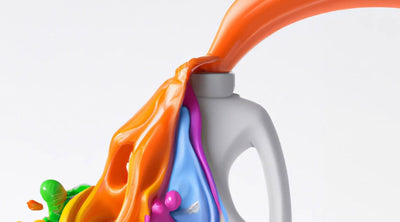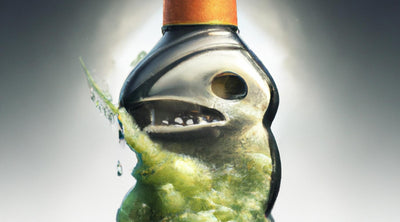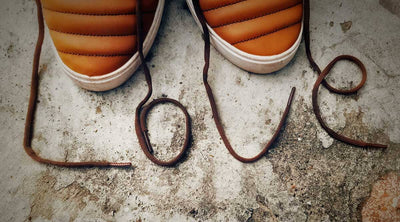4 Pros and 4 Cons of Biodegradable Plastics
februar 24, 2020Plant based, biodegradable plastics are on the rise and for good reason. They reduce our dependence on fossil fuels and all their destructive qualities. But, nothing is perfect and biodegradable plastics are no exception. So what are the pros and cons of biodegradable plastic or bioplastics?
The short answer
Cons
The confusion surrounding bioplastics

Much like it sounds, bioplastic and biodegradable plastic is made from more natural sources. It is designed to break down easier and/or reduce our consumption of fossil fuels.
Technically speaking, normal plastic will break down, it will just take about 400-1000 years (give or take) to do so. How old would you be when it finally does? Pretty old I bet. We’ll be rolling in our graves thinking about the plastic we left which is still on earth.
However, there is a lot of confusion surrounding more eco-friendly plastics. One of the big areas of confusion is whether that plastic is actually compostable or just made from plant materials.
In this article we’ll be explaining the pros and cons of plastics made from plants in general. But, let’s first talk about the difference between biodegradable and compostable plastic.
What is biodegradable plastic / bioplastic?

Biodegradable plastic refers to the plastic made out of natural plant resources rather than petroleum. Biodegradable plastics don’t have a time frame required for certification and are therefore mostly intended to reduce fossil fuel demand.
However, these plastics are usually easier to break down and have less chemicals in them. Although, they can certainly possess similar chemicals to plastic such as BPA’s. It's worth noting that toxin free PLA plastic is relatively easy to source. Totally confused? Yeah, me too. Maybe we can shed some light on this confusing topic by explaining what compostable plastics are.
What is compostable plastic?

Compostable plastic is taking things a step further in actually requiring a specific time frame to be broken down. Keep in mind, the compostable plastic we see a lot of times is not able to be thrown in our backyard food scrap pile. It will require industrial composting which many parts of the world don’t have access to yet
That being said, there are legit compostable plastics that you can simply throw in a compost pile. The mixture of soil, bacteria, oxygen, and moisture will allow it to break down in a matter of months rather than several hundred years. Keep in mind though, no matter how compostable something is, it will not break down properly in a landfill.
The cons explained

Most of the cons we see from biodegradable or compostable plastics are applied only when they are single use versions.
Let’s take a single use, corn based, plastic cup for example:
Con 1) When we are using plastic cups made from corn every single day this is of course better than petroleum. But, there are problems with this because we are still demanding resources that aren’t necessary. They aren’t necessary simply because we could choose a reusable cup instead.
Con 2) Our brains sadly don't know the difference between corn based plastic and regular plastic. When we use single use items in one area of our lives which are made from corn, we are building the habits and mindset that will use single use items elsewhere. Corn based or not. For more about impacts on our mindset, click here.
Con 3) Something that could also be misleading about this plastic cup is just how natural it really is. There is potential (especially with less rigorous certification) for it to still contain many chemicals that once the cup breaks down, can harm our environment much like normal plastic.
Con 4) Let’s say we begin using all biodegradable plastics. Many areas in the world don’t have access to community or industrial composting, most areas in the U.S. even. This leaves us sending our bioplastics to the landfill where they will almost certainly never break down due to the lack of oxygen, moisture, and soil.
The pros explained

Though the benefits of bioplastics can be applied to both single use and reusable items, they shine the brightest when applied in a reusable form. This is because the resources used and saved are all to create a product once, which will last for (hopefully) a long time.
Pro 1) Traditional plastics are made from fossil fuels which create a demand for more emissions, more habitat loss, and more regression away from an environmentally focused society. Plastics made from alternative sources reduce this demand and move us towards a more earth focused world.
Pro 2) Harvesting corn or other plant sources creates a significant amount of less energy than demanded by harvesting the crop known as fossil fuel.
Pro 3) Corn and other plants will break down and return back to the soil. Normal plastic could take several hundred to even 1000 years to decompose while leaving toxins once that point is reached. Bioplastics can be sent to an industrial composting facility where they could be broken down within 90 days of use. Truly compostable plastics can even be thrown into our backyard or neighborhood food scrap piles.
Pro 4) Majority of PLA plastics or biodegradable plastics can be manufactured and broken down with little to no toxins involved. This is beneficial to human as well as environmental health.

In summary
Everything that can be made durably enough should be made from alternatives to petroleum. At the end of the day, a corn based plastic cup is better than a petroleum based plastic cup. What’s even better is a reusable cup. And what’s best is a durable, reusable cup made from natural sources which will return to the soil once its life is over.
Sometimes we go through a lot of trouble to create these amazing new inventions, like say...corn plastic. But we may begin to realize the simplest solutions are the ones that don’t require a lot of research, they simply require a small lifestyle change.
Bioplastics of course have their uses and benefits. We should however, remain cautious to not use these plastics as a way to avoid doing the work required for making essential lifestyle changes.
MORE Sustainability 101 ARTICLES View all ›
Ready to make
the switch?
- Powerful Cleaning
- Dissolves Easily
- Skin-Friendly
- Eco-Friendly
- No Mess














